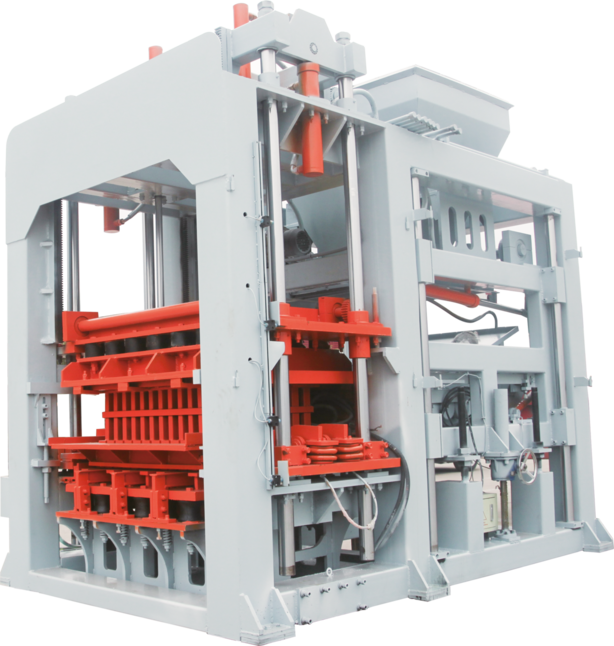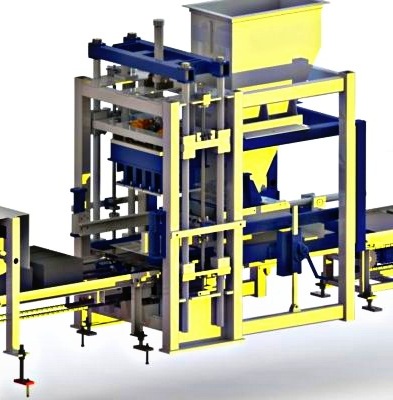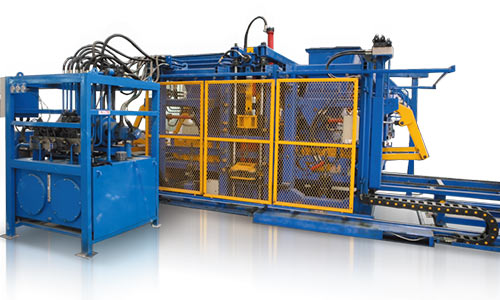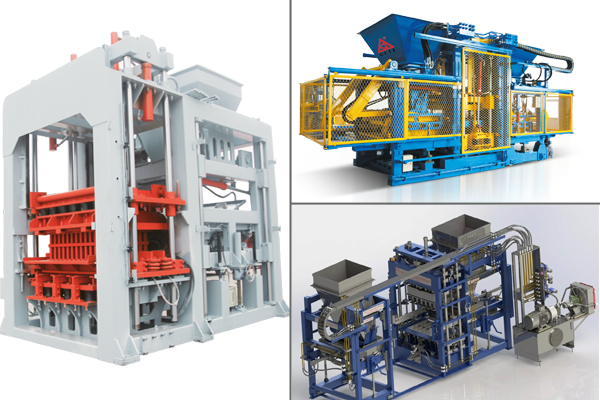A concrete block machine is a mechanical device that is designed and manufactured to produce concrete blocks as per requirement. The concrete block machine produces concrete blocks of a uniform size, which ensures a modular system along with accuracy and perfection. Modern automatic block-making machines are integrated with advanced control systems. New and advanced technology-based block-making machines make production fast and efficient. The effective Vibro press systems and complex feeding systems produce each unit with high precision and accuracy. The blocks manufactured from the machines are highly rigid, vibration resistant and durable. The newer models offer multiple advantages economically, in terms of constructive performance and build quality. With the modern concrete block-making machine you can manufacture Concrete Blocks, Fly ash Bricks, Cement Bricks, Interlocking Pavers, Solid Blocks, Colored Paver Blocks etc.
Concrete block machines for an entrepreneur
Concrete block machines can be greatly utilized by new and small-scale entrepreneurs. The goal of a starting entrepreneur is balancing cost effectiveness with productivity. you can attain that with the modern range of concrete block making machines. The latest models can be installed in a small place and you can start a small-scale business with limited resources. The standard machine model starting from can be set up in less than 200-400 Sq.mt area. You can have greater quality control output with these concrete block machines. You need less labour and get an increased output. Different ranges of products can be produced from the same machine with a simple and fast mold change, keeping costs down and prices competitive There are different types of models of block-making machines with different production capacities. With the right machine, the block laying capacity can be 500 to 25,000 blocks per day.
The advantages of concrete block-making machines;
- Quick and accurate production
- Integrated with advanced control systems
- The dimensional accuracy of the block is perfectly achieved.
- Consistent quality by fixing different types of moulds and ram in the machine.
- Toggle plate transmission and material level control
- increased output
- High-speed production of blocks based on machine type and aggregate being used
- Assembly quality
- Customizable
- Increased extrusion pressure
How to Choose the Right Concrete Block Making Machine?
Careful planning is decisive in the selection of concrete block-making machines. The planning should consider the production requirements and site-specific parameters. The selection of concrete block-making machines depends on various factors as discussed below.
Automation
There are mainly two types of automation available for concrete block-making machines; fully automatic concrete block-making machines and semi-automatic concrete block-making machines.
Production Capacity
These machines have different production capacities that may vary in their working areas according to their production capacities. Firms with low production levels generally prefer manual production machines, while firms with high production levels prefer semi-automatic or fully automatic production machines. Production Capacity ranges from 500 per shift. up to 25,00 and per hour.
Mobility
There are two types of concrete block-making machines based on movability: the stationary type and the mobile type. Mobile concrete block-making machines also known as egg-laying brick-making machines have the capability of moving. A stationary concrete block-making machine needs to be established on a hard, concrete foundation. This machine uses pallets to produce concrete products.
Compression Efficiency
Compression in the concrete block-making machine is done by employing hydraulic cylinders, which can produce a much stronger block, thus reducing the cement consumption even further.
The method of production of concrete blocks
The method of production of concrete blocks includes;
- Batching and mixing: Mix cement and aggregates using a shovel or mixer until it reaches a homogeneous condition.
- Moulding: Put the mixture into wooden or steel mould boxes or moulding machines. Demould blocks immediately after compaction.
- Curing: Cover demoulded blocks with plastic sheets. Keep the concrete blocks moist by keeping them under water in tanks or by regularly spraying them with water for 7 days.
- Cubing- Racks roll out of a klin where unstacking of all pallets takes place and then passes onto a chain conveyor belt.
- Storing; Do not expose them to direct sunlight; keep the blocks in a dry and covered area. store for 2 weeks before usage.
Types of concrete block-making machines
Automatic Concrete Block Making Machine
Automatic concrete block-making machines adopt PLC control systems and use concrete, cement, and fly ash as raw materials to produce quality blocks automatically. The finished blocks have wide applications, such as road and building projects. Different blocks are made for specific purposes. The machine can handle all four portions of the concrete block-making process automatically. This includes the batching process, the mixing of the materials, the manufacturing, and subsequently the delivery of the products. Its production capacity is 2000-2500 Blocks per hour.

Semi-Automatic Concrete Block Making Machine
This is a portable machine that comes with semi-automated functions. Various types of concrete blocks like cavity blocks, solid blocks, compound wall blocks, lintel blocks, road divider blocks, etc. as per client design can be manufactured on this machine. For various types of concrete blocks, various types of rams and mould pairs are to be used, and they are interchangeable.ts production capacity is 1800-2000 Blocks per hour.

Concrete Paver Block Making Machine
Concrete paver block machines are manufactured in different capacities and at different automation levels. The most important feature that separates the paver block machine is that it has two buckets. The machine produces a double-layer paver with a colorful design. Paver block machines are available with automatic systems. Paver block-making machines use special vibration systems, which make it possible to produce high-quality and durable concrete products. Its production capacity is 1000-1500 Blocks per hour.

Concrete Solid Block Making Machine
Concrete Solid Block Making Machine is a heavy-duty model, an egg-laying type hydraulically operated concrete block-making machine on wheels. It can lay a block on the concrete floor and move to the next level. Any type of concrete block can be produced with consistent quality, high strength and pressure with accurate sizes by fixing different types of concrete mould and ram in the machine. Its production capacity is 500-1000 Blocks per hour.

Concrete Hollow Block Making Machine
The Concrete Hollow Block Making Machine machine has moulds in the shape of hollow blocks, and when the mortar is poured inside these molds, the machine uses vibration and hydraulic force to press the mortar into the molds. Any type of concrete block can be produced with consistent quality by fixing different types of concrete mould and ram into the machine. Our new spares are readily available to replace the interchangeable wearing parts. Its production capacity is Capacity 2000-2500 Blocks per hour.

Hydraulic Solid Block Making Machine
Concrete Hollow Block Making Machine can lay blocks on the concrete floor and move to the next layer. Any type of concrete block can be produced with consistent quality by fixing different types of concrete mould and ram in the machine. Its production capacity is 500-1000 Blocks per hour.
Conclusion
Concrete blocks are very popular and are widely used in building construction in the country because of their several benefits, such as durability, strength, structural stability, fire resistance, insulation, and sound absorption. The concrete blocks have an attractive shape and are readily available for any style of architecture. The Indian concrete block machine market is driven by a rising focus on reconstructing the present infrastructure and growing investments in residential construction. The emergence of sustainable building materials is further expected to fuel the market’s growth further.





